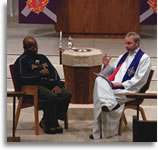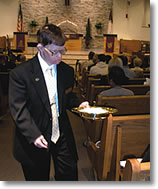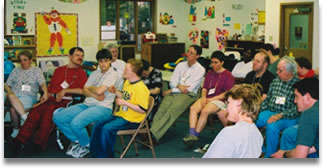by Rev. Charles E. Werth
 |
|
Paris Adams (left) walked five miles to attend First Trinity, Tonawanda, N.Y. Members welcomed him, introduced him to Bible class, and provided transportation for him. After several months, Paris was baptized by Pastor Chuck Whited during a Lenten Service.Photo courtesy Bethesda Lutheran Communities |
Within the span of three weeks recently, events in the public square and the media confirmed that we are increasingly living in a culture of disrespect. Two gaffes by politicians and a disgusting parody of a person with Down syndrome on the Fox network’s popular “Family Guy” made individuals with developmental and intellectual disabilities the most recent targets of disrespect.
When a White House insider used an outmoded and derogatory term, responses from human-care ministries around the country were rapid and decisive. “Spread the Word to End the Word,” a campaign created by youth, initiated an ongoing effort with Special Olympics and Best Buddies International to raise the consciousness of society about the dehumanizing and hurtful effects of the word “retard(ed).” The campaign encourages everyone to stop using the R-word. Bethesda Lutheran Communities is a co-sponsor in this effort.
Advocacy groups organized by and for individuals with disabilities, such as Bethesda Voices, were quick to issue action alerts when the media carried the story of a political figure who suggested that children with disabilities are a punishment from God.
The over-the-top lampoon on“Family Guy” denigrating a teenager with Down syndrome has further galvanized the nearly 20 percent of the U.S. population with some form ofdisability—not to mention the parents,guardians, siblings, and people who provide support and services for individuals with disabilities.
Issues That Affect Us All
But what about those times when no brouhaha is swirling around individuals with intellectual and developmental disabilities? What is the Church, especially our Lutheran Church, doing to educate, enlighten, and empower people to respect all of God’s gifts, including people with disabilities? Congregations are to be applauded for efforts such as adding elevators, accessibility ramps, and enhanced audio systems. Is this enough, however, to be considered inclusive of people with disabilities? One in five Americans has a disability. It’s our nation’s largest minority group. It’s also the most inclusive and diverse minority group, affecting people of all ages, genders, religions, ethnicities, and socioeconomic levels. And it is the only minority group that any person can join at any time—at birth, or later—through an accident, illness, or the aging process. And that begs the question: Just how inclusive are our congregations and how open are we to providing spiritual support to people with disabilities?
Our society views people with intellectual and developmental disabilities as inferior, broken, and with little to offer. Our language betrays this attitude. When the local traffic reporter announces that there is a “disabled” car in the left lane of the freeway, we envision a vehicle that must be towed away because it is powerless to act on its own. Unfortunately, we have adopted the same language when referring to people: “He [or she] is disabled.” With that description, we render the whole person as less than useful.
However, when we adopt language such as “she [or he] has a disability,” we are careful not to discard the whole person, but simply acknowledge that the individual is “differently abled.” The apostle Paul, in 1 Corinthians 12, tells us that all people are indispensible in the Church. Outreach ministries to that 20 percent of the population with some form of disability seek to bring them into the Church, where their gifts can be developed, and all are edified.
Without adopting a paternalistic or patronizing attitude toward individuals with disabilities, the church of Jesus Christ is called to be a sanctuary from the caustic cruelty of our culture of disrespect. After all, isn’t that how we refer to the worship space within our church buildings: the sanctuary?
Bethesda Lutheran Communities, like several other Christian agencies, provides holistic support (physical, emotional, and spiritual) for individuals with developmental and intellectual disabilities. About 90 percent of those whom Bethesda supports live in community-integrated housing in 13 states. Community-based living provides a degree of “normalcy” that an institution cannot offer. The majority of individuals with some form of disability say they prefer this model.
Congregations Become Sanctuaries
 |
|
Photo courtesy Bethesda Lutheran Communities |
The move to community-integrated support has required a change in the model for providing spiritual support. Bethesda Lutheran Communities now provides spiritual support in the individuals’ homes and in their home congregations. The local congregation has become the spiritual sanctuary for a vast community of people with developmental and intellectual disabilities.
The mission of Bethesda’s Department of Religious Life is to “spiritually empower individuals with developmental and intellectual disabilities to become all that God intends them to be, here and in the world to come.”
The Religious Life staff has grown into a national network of 28 ministry consultants and religious-life directors.
The consultants help individuals find church homes and become active members of congregations.
The Religious Life mission is driven by a vision that we “initiate and enrich ministries within congregations, parish schools, church-related secondary schools, and other agencies to provide spiritual supports and services by growing them into places of belonging and becoming for people with intellectual disabilities.”
More than 100 “Partner Congregations” (Lutheran congregations that have been equipped to provide the full range of spiritual supports and services to Bethesda family members) arrange for participation in worship and Bible study, and involvement in the social activities of the parish.
Pastors, DCEs, deaconesses, and lay members in these congregations are equipped to provide local, hands-on ministry to people supported by Bethesda. Members of partner congregations are encouraged to visit the homes of supported individuals, lead in-home Bible studies, and offer help in other ways.
Turned Away from the Church
Many with disabilities (and their families) are not integrated into the faith community. Some have left the Church because members and professional church workers did not understand their needs or know how to nurture them.
How can congregations reach out to individuals with developmental and intellectual disabilities who are living with family members or are supported by organizations that are not faith-based?
To effectively reach these individuals and their families for Christ requires a patient process of relationship building. As with any new member, once an individual with a disability is in the Church, it is then important to assimilate that individual into the life of the congregation through the relationships that are formed.
There is no single “best” outreach model. What is common to all models, however, is that there be a safe, non-judgmental, and comfortable entry point to the Church for the individual with a disability and for their families or service providers. The Church must be perceived as a sanctuary.
 |
Bible studies provide an entry point to reach out to people with disabilities.
|
Outreach Opportunities for the Church
Through the BethesdaNetwork, ministry consultants have equipped some 180 congregations (Lutheran and other Christian denominations) to reach out to people with disabilities and their families in areas where Bethesda does not provide other services. Also, Bethesda-affiliated ministries such as Lutheran Disability Outreach and Lutheran Disability Ministries work through congregations and other agencies to reach out to these individuals.
With the goal of integrating people with developmental and intellectual disabilities into congregational life, ministries take a powerful stand for including the whole body of Christ in the church family. Guided by experienced consultants, congregations can engender a rich, diverse fellowship in the Body of Christ as it ministers to, with, and through people with disabilities, and those who love them.
As it is for all people, it is critical to the well-being of people with developmental and intellectual disabilities that they have a faith relationship with Jesus Christ. People with disabilities can and should be fully included in the life of local Christian congregations in ways that empower them to be all that God intends and that create sanctuaries in a culture of disrespect.
—
About the Author: Rev. Charles E. Werth is vice president of religious life and church relations at Bethesda Lutheran Communities, Watertown, Wis.





